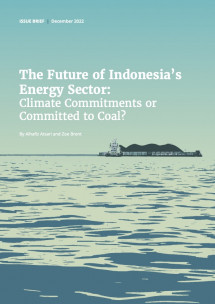Ideas into movement
Boost TNI's work
50 years. Hundreds of social struggles. Countless ideas turned into movement.
Support us as we celebrate our 50th anniversary in 2024.

Indonesia’s empty climate promises and commitment to coal today are a reflection of short-sighted and pro-capital policymaking at a time when the planetary implications are catastrophic. This issue brief unpacks the details of how Indonesia's production of coal is being ramped up rather than phased out.

After lengthy negotiations, leaders of the Republic of Indonesia, Japan, the United States and other partner countries came away from the G20 summit, held in Bali in parallel to the COP27 in November 2022, with what many are celebrating as a historic agreement. The government of Indonesia made a deal with the G7 group of industrialised countries plus Denmark and Norway. Called the Just Energy Transition Partnership (JETP), is billed as, ‘the final piece of Indonesia’s puzzle to accelerate its energy transition’.
The JETP is a $20 billion financing package to facilitate Indonesia’s transition from coal to renewable energy. As one of the world’s largest coal producers and fifth largest greenhouse gas emitter, this announcement is indeed encouraging news. As the details of the plan will still be hashed out over the next six months, it remains difficult to fully evaluate the agreement’s real impact. Nonetheless, this article aims to provide an overview of Indonesia’s coal sector, as well as its existing climate commitments, in hopes of making sense of these new developments.
While coal mining in Indonesia dates back to the activities of Dutch colonial forces in the 1800s, it is only over the past 40 years that Indonesia has become one of the world’s leading coal hubs. Indonesia churns out enough floating barges filled with black mountains of the world’s dirtiest energy source to make it the world’s fifth-largest coal producer. The country also has the globe’s 10th largest coal reserves. It exports some 63% of its production. That is enough to make it the top exporter of thermal coal, which is used to produce electricity from India to Germany. Indonesia produces nearly 90% of Southeast Asia’s coal supply. In terms of domestic consumption, Indonesia is also highly dependent on coal to meet national electricity needs. In 2021, Russia was responsible for almost 20% of global thermal coal exports. Now, as a result of the war in Ukraine and the resulting sanctions, coal prices are surging and banks stand at the ready to profit. 'In Indonesia, the boom in lending is especially pronounced in the province of East Kalimantan, the country’s coal-mining heartland. According to official data, bank loans to the provincial mining industry grew by 74.36% year-on-year in February 2022, compared to 18.87% growth in overall lending.’
Meanwhile, the Indonesian government has committed to reduce greenhouse gas emissions. Despite such promises (which necessarily demand the country phase out coal), the state is facilitating the construction of coal-fired power plants on a massive scale. They are granting permits to mining entrepreneurs, securing funding through national and international banks, and issuing favourable regula- tions such as the Omnibus Law and the revision of Law No. 3 of 2020 concerning Minerals and Coal. This continued dependence on dirty coal energy is not only bad for green- house gas emissions, it also has very serious implications for already marginalised communities — especially along Indonesia’s extensive coastline. Pollution of fishing zones, adverse health effects on humans, and policy processes which sideline communities are all part of the expanding coal landscape in Indonesia explored in this article. As we will see, the political will to confront climate change is lacking. The government of Indonesia, influenced by corporate interests and corruption, is prioritising immediate profit over future generations. At the same time, the Indonesian case points to the relevance of conversations about climate reparations, raises important questions about how we got here and what constitutes truly just energy policies.